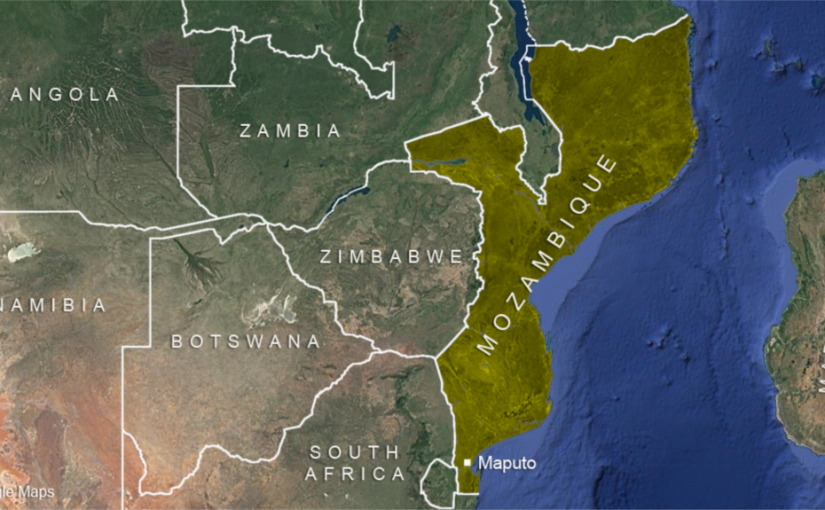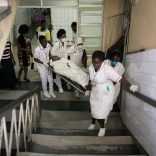Thousands fleeing Mozambique violence: UN
Mozambique: Stalemate blocks Pemba food; Total declared force majeure with no return til war ends – By Joseph Hanlon

- Stalemate continues: only private food is reaching Palma, with no UN or official help
The stalemate continues, with government insisting it must distribute humanitarian assistance in Palma, but having no system to do so. Meanwhile government has barred anyone leaving by sea, and will not even allow fishing boats because those were used earlier to transport people leaving.
Two weeks ago a barge arrived in Palma with six lorries, which are said to have driven around Palma looking for someone from the government’s INGD (Instituto Nacional de Gestao e Reducao do Risco de Desastres, ex INGC) to distribute the food. Finally the loaded lorries were sent back to Pemba. About 10 days ago 100 tonnes of food and other emergency supplies organised privately arrived in Palma, but has disappeared.
Frelimo Secretary General Roque Silva and a delegation visited Palma Sunday 18 April and addressed rallies. In Quitunda, the resettlement town at the gates of Afungi, he said Frelimo was giving 20 tonnes of food. But the private businesses sending food to Palma said the 20 tonnes had been taken from their 100 tonne delivery. But there are no reports of even the 20 tonnes being distributed.
Meanwhile the World Food Programme (WFP) and other agencies are still not sending food and other essentials to Palma. They have been ready to send for two weeks, but cannot obtain agreement. They insist on doing their own distribution. The apparent disappearance of the 100 tonnes and the realisation that INGD has no distribution system has made them even more anxious about releasing aid to the military or a government agency.
This hard line is not totally accepted, however. One business person stressed the priority is to get food and medicines into Palma, They said there was a need for mutual “respect”. People distributing food would be given “respect” in exchange for showing “respect” for the local authorities – Frelimo and the defence forces. In effect, that means negotiating an arrival tax. WFP appears to have been unwilling or unable to negotiate the terms of mutual respect.
There is some food to buy, but food prices are rising and there is increasing tension. For most people, there is no food or clean water, and disease is increasing – particularly malaria – but health services are closed.
- Volunteers step in
Volunteers are being allowed to provide some humanitarian aid and evacuation. Mission Aviation Fellowship (MAF) local partner Ambassador Aviation has been flying a 14-seat Cessna Grand Caravan between Palma and Pemba. It has evacuated 335 refugees on 41 flights. Working with VAMOZ (Voluntarios Anonimos de Mocambique – Anonymous Volunteers) it has flown in 1,546 kg of donated food aid. https://www.maf-uk.org/news/maf-partner-ambassador-aviation-evacuates-refugees-fleeing-from-is-linked-attacks-in-mozambique
MAF flew for two weeks from 7 April, then had to stop for maintenance and then due to the heavy rain and wind from Tropical Storm Jobo. Flights resumed this morning, including bringing medicines, especially for malaria.
Vamoz grew out of support for people in Beira at the time of cyclone Idai in 2019. It works entirely with volunteers; no money changes hands and there are no employed staff. It has been working in Palma since last September. After the insurgent attack it organised a lost and found list, and subsequently a psychological support telephone help line. It is organising food shipments and evacuation. Everything is provided free, by Pemba companies and individuals. Cash donations are given to VIP supermarket in Pemba which supplies goods at cost price. Vamoz attempts to document everything to prevent leakage. Reef Investimentos is organising a barge, which will arrive in Palma Wednesday (28 Apr) with 30 tonnes of donated supplies.
Vamoz has organised volunteers in Palma, for example drawing on nurses, teachers and other civil servants who are not working because government offices and health facilities are closed. The volunteers helped organise priority lists for MAF evacuation, stressing children, the elderly, sick and injured people, and pregnant women in distress.
Vamoz also organised the distribution of the 1.5 tonnes of food that it was able to send by plane, working through local community leaders. See the photo, which is from Quitunda in a video on http://bit.ly/Moz-Palma-Food (20 Mb)
A distribution list for the 30 tonnes due to arrive Wednesday has been organised with local volunteers and community leaders to give priority to the most vulnerable. But this is a much larger shipment than has been sent though Vamoz before, and it will be a test. Will local Vamoz volunteers and community leaders be allow to follow their distribution plan. And how large will the arrival tax be?
- No one can leave, as local people become the enemy
Although some residents are returning to Palma, many are still trying to leave. Estimates are of up to 30,000 displaced people trying to leave. The are equally frightened of insurgents and security forces. The MAF flights are still being allowed to evacuate people, but boats are banned and government would not allow LAM to set up a regular flight to Afungi with a larger plane.
It appears that the defence forces (FDS) see the community as the enemy. They know the insurgents who have some local support. Insurgents have infiltrated with refugees in various places. Boats take the displaced to Pemba where there is already fear and panic about a possible insurgent attack, so the government and FDS have banned all travel out of Palma to stop insurgents reaching Pemba.
Civilians claim they are harassed and even shot or disappeared by the FDS, which distrusts all local people. This combines with the hunger and disease to make people want to flee.
11 refugees were killed when a sailboat heading to Pemba sank in bad weather near Ibo island.
- Insurgents say no Ramadan attack on Palma – opposite of ISIS
Insurgents have told local people in Palma that the will not attack during the month of Ramadan, which ends on 12 May. But they predict another attack after that. Mocimboa da Praia and other district capitals were attacked several times, with the insurgents then withdrawing, before those towns were finally attacked and occupied.
But the message to local people underlines that the local insurgents, al Shabaab, are not taking instructions from ISIS. Ramadan is the time for noble actions, and ISIS has always interpreted this to require a step-up in the jihad and launch new offensives during that month. The message to local people from Al Shabaab confirms that it has taken the opposite line, with a defacto cease fire.
- Total declares force majeure – with no return until war is over
Total today (26 April) declared “force majeure” on its Mozambique LNG project, due to “the security situation in the north of the Cabo Delgado.” The declaration was made by Total headquarters in Paris. https://www.total.com/media/news/press-releases/total-declares-force-majeure-mozambique-lng-project
Declaring “force majeure” means that because of an event beyond the control of the contracting parties, in this case the war, Total declares that it has no liabilities, obligations or responsibilities under its contracts on the LNG project. “Force majeure” is not a cancellation of contracts, but their suspension until the problem has been resolved.
The National Petroleum Institute (INP) in a statement this morning warned that Total’s action could lead to Total “suspending or cancelling more contracts with suppliers of goods and services.”
In its statement, the French company goes on to say: “Total expresses its solidarity with the government and people of Mozambique and wishes that the actions carried out by the government of Mozambique and its regional and international partners will enable the restoration of security and stability in Cabo Delgado province in a sustained manner.”
The phrase “restoration of security and stability in Cabo Delgado province in a sustained manner” means Total is not coming back until the war is completely over, and that it will no longer accept just a security zone around Afungi. This suggests Total has decided not to accept a permanent war, as it has in the Niger Delta of Nigeria.
President Filipe Nyusi will probably go to Paris on 18 May for the French Africa summit where he will try to negotiate with Total to secure its return and with the French government for military support. Although now privatised, Total remains closely linked to the French state, so Nyusi will need some agreement with President Emmanuel Macron.
ENI’s floating LNG platform should arrive in early 2022, said Public Works Minister Joao Osvaldo Moisees Macatine. The platform costs $8 bn, and should generate profits of $41 mn per year, of which $19 mn eventually goes to government.
Promises
- Fair distribution of resource wealth
President Filipe Nyusi on 21 April promised to ensure that the distribution of wealth from natural resources is structured, fair, inclusive and sustainable, to benefit every citizen in the country.
Addressing the opening session in Maputo of the 7th Conference and Exhibition on Mining, Oil, Gas and Energy, Nyusi said Mozambique wants to avoid the experiences of other countries, which failed to use the wealth from their resources to develop their own economies.
- Credit Suisse crisis: did British politicians learn from Mozambique?
The Credit Suisse role in the $2 bn Mozambique secret debt is being replayed in Britain, with politicians promoting loans to failing companies.
Credit Suisse (CS) was forced to raise $2 bn from investors on 22 April following the crisis caused by two of its big client companies collapsing in March. CS lost more than $3 bn on Greensill and $4.7 bn on Archegos Capital. CS announced Brian Chin, chief executive of the investment bank, and Lara Warner, chief risk and compliance officer, would leave the bank.
CS is “a bank that looked the other way when warning signs argued for pulling back on lucrative corners of its business,” noted the Wall Street Journal (8 Apr). In the case of Greensill, there had been “years of internal warnings.” Cases of looking the other way include the Mozambique secret debt, and are detailed in https://www.wsj.com/articles/credit-suisse-ignored-warnings-before-archegos-and-greensill-imploded-11617875627
British politicians were heavily involved in Greensill, and Mozambique-watchers will note striking similarities to the role of Credit Suisse in the $2 bn secret debt scandal. The key player is David Cameron, Conservative Prime minister 2010-6. As PM, he named Lex Greensill a senior advisor. Then in 2018 Cameron joined Greensill Capital as an advisor, with shares that would be worth $250 mn when the company listed on the stock exchange. In January 2020 Credit Suisse was attracting investors for Greensill with a presentation that said Greensill was a “once in a generation” investment chance that “any growth investor must own”.
By March 2020 at the start of the Covid-19 epidemic, Cameron knew Greensill was in financial trouble and tried to raise $25 bn in government support, with e-mails, texts and phone calls to senior officials, including the deputy governor of the Bank of England, the Chancellor (finance minister) Rishi Sunak, and the secretary to the Treasury. On 23 Apr Sunak texted Cameron to say Greensill would be helped. But in March 2021 Greensill went bankrupt. A string of other politicians and civil servants were also working for Greensill.
In the past two weeks it has been revealed that the UK has government by text and WhatsApp. Many people have Prime Minister Boris Johnson’s phone number, which has not been changed in a decade. There was a text messages from Saudi Crown Prince Mohammed bin Salman and a text exchange with Tory donor and vacuum cleaner maker James Dyson in which Johnson agrees to sort out a tax problem “tomorrow”. (Guardian 23, 24 Apr)
And there is the “VIP lane” or “crony list”, a special list of contacts of Boris Johnson, Tory officials, advisors, MPs etc which was fast tracked for government contracts.
For Mozambique, government by phone, text and WhatsApp has been the norm for years, as has been contract preference for friends of Frelimo. A decade or more ago Britain and other donors promoted “good governance”, and suggested government by phone and friends was not good. But it appears Britain has changed its mind, seen the advantage of how things are done in Maputo, and adopted the Mozambican system.
By Joseph Hanlon














Leave a Reply
Be the First to Comment!
You must be logged in to post a comment.
You must be logged in to post a comment.